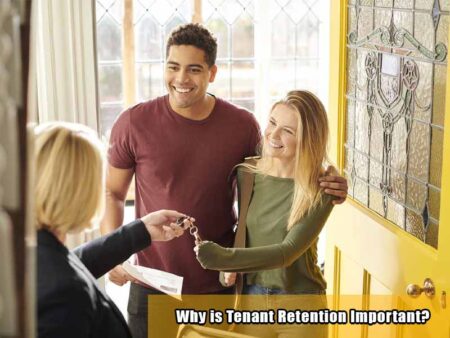Hey there, fellow landlords and property managers! Today, we’re diving into an important topic that can make or break your rental business: tenant retention. Keeping your tenants happy and ensuring they renew their leases is crucial for maintaining a steady income and reducing turnover costs. Let’s explore why tenant retention is so important, how to calculate your tenant retention rate, what makes a good retention rate, and some proven strategies to keep your tenants around.
Why is Tenant Retention Important?

First off, let’s talk about why tenant retention matters. When tenants move out frequently, it can get pretty expensive. You’ve got to clean the unit, make repairs, advertise the vacancy, and possibly lose rental income while you look for new tenants. Plus, it’s time-consuming and stressful to go through the whole process repeatedly.
On the flip side, when tenants stay longer, you save money and time. You get a more stable and predictable income, which makes financial planning easier. Long-term tenants often take better care of the property because it feels like home to them. This means fewer maintenance issues and repairs for you.
Calculating Your Tenant Retention Rate

Now, let’s figure out how to calculate your tenant retention rate. It’s a simple formula that gives you a clear picture of how well you’re keeping your tenants. Here’s how you do it:
Tenant Retention Rate=
(Number of Tenants at End of Period−Number of New Tenants During Period) / Number of Tenants at Start of Period X 100
Let’s say you want to calculate the tenant retention rate for a one-year period:
- Number of tenants at the start of the year: 100
- Number of new tenants during the year: 20
- Number of tenants at the end of the year: 90
Using the formula:
TRR= (90-20)/100 = 0.07
= 0.07 x 200= 70%
In this example, the Tenant Retention Rate is 70%. This means 70% of the tenants who were there at the beginning of the year stayed until the end of the year.
This percentage tells you how good you are at keeping your tenants happy and sticking around.
What is a Good Tenant Retention Rate?

So, what’s a good tenant retention rate? It can vary based on the type of property and the local rental market. But generally, a retention rate of 75% or higher is pretty good. If you have a high-end residential property, you might aim even higher. If your property is in a more transient area, your expectations might be lower.
It’s helpful to compare your retention rate to industry benchmarks and local market conditions. Consistently high retention rates mean you’re doing something right, while lower rates might indicate areas where you need to improve.
How to Retain Your Tenants: 8 Proven Strategies

Let’s dive into some tried-and-true strategies to keep your tenants happy and encourage them to stay.
1. Maintain the Property
Keeping your property in top-notch condition is key. Regular maintenance, timely repairs, and clean common areas go a long way in keeping tenants satisfied. When tenants see that you care about the property, they’re more likely to stay.
2. Communicate Effectively
Good communication is crucial. Be prompt in responding to tenant inquiries and concerns. Keep them in the loop about any changes or maintenance work. Building a strong relationship with your tenants can create a sense of community and loyalty.
3. Offer Lease Renewal Incentives
Who doesn’t love a little incentive? Offering perks for lease renewals can encourage tenants to stay. Consider giving a small rent discount, upgrading appliances, or offering a free professional cleaning service. These gestures show that you value their continued residency.
4. Ensure Fair Rent Increases
Rent increases are sometimes necessary, but they should be fair and reasonable. Sudden or significant rent hikes can drive tenants away. Instead, go for smaller, incremental increases that reflect market trends and the property’s value.
5. Create a Sense of Community
Organizing social events or community activities can help tenants feel more connected to their neighbors and the property. A strong sense of community can enhance tenant satisfaction and increase the likelihood of lease renewals.
6. Provide Excellent Customer Service
Exceptional customer service can set your property apart. Train your staff to be courteous, professional, and responsive. Addressing tenant concerns swiftly and effectively can build trust and loyalty.
7. Upgrade and Modernize
Periodically upgrading and modernizing the property can keep it attractive to tenants. This could involve installing energy-efficient appliances, updating fixtures, or enhancing security features. Modern amenities can improve tenant satisfaction and retention.
8. Conduct Regular Surveys
Regularly soliciting feedback from tenants can help you understand their needs and concerns. Conduct surveys to gauge their satisfaction and identify areas for improvement. Acting on this feedback demonstrates that you value their opinions and are committed to providing a high-quality living experience.
How to Retain Tenants

Beyond the eight strategies mentioned, here are some additional tips to help you keep your tenants happy and sticking around.
Flexibility with Lease Terms
Offering flexible lease terms can be attractive to tenants who may not want to commit to a long-term lease. Shorter lease options or the ability to transfer the lease to another unit within the property can provide convenience and peace of mind.
Personalized Touches
Adding a personal touch can make a big difference. Remembering tenants’ birthdays, anniversaries, or other significant dates and acknowledging them with a small gift or card can make tenants feel valued and appreciated.
Efficient Property Management Software
Using property management software can streamline communication, rent collection, and maintenance requests, making the tenant experience more seamless and less stressful.
Proactive Problem Solving
Anticipate and address potential issues before they become significant problems. Regular property inspections and maintenance checks can help identify and resolve issues early, preventing tenant dissatisfaction.
Provide Amenities and Services
Offering amenities like a gym, pool, or laundry facilities can make your property more attractive. Additionally, services like package delivery lockers or on-site maintenance can add convenience and improve tenant satisfaction.
Transparent Policies
Having clear and transparent policies can build trust with your tenants. Make sure your lease agreements and community rules are easy to understand and consistently enforced.
Foster a Positive Living Environment
Creating a safe and welcoming environment is crucial. Ensure that your property is well-lit, secure, and free from nuisances. Address any safety concerns promptly to make tenants feel secure.
Reward Loyal Tenants
Recognize and reward long-term tenants. This could be through loyalty discounts, priority for upgrades, or exclusive access to amenities. Showing appreciation for their loyalty can encourage them to stay even longer.
Conclusion
Tenant retention is vital for successful property management. By maintaining the property, communicating effectively, offering incentives, ensuring fair rent increases, creating a sense of community, providing excellent customer service, upgrading and modernizing, and conducting regular surveys, you can significantly enhance your tenant retention rates. Additionally, adopting flexible lease terms, adding personalized touches, using efficient property management software, being proactive in problem-solving, providing amenities and services, maintaining transparent policies, fostering a positive living environment, and rewarding loyal tenants can further improve tenant satisfaction and retention.
By focusing on tenant retention, you can reduce costs, stabilize rental income, and create a thriving rental community. Happy tenants are more likely to renew their leases, take better care of the property, and recommend your property to others. Implementing these strategies can help you build a positive reputation and ensure long-term success in the rental market.
So, take a proactive approach to tenant retention, and you’ll see the benefits in no time. Happy renting!







